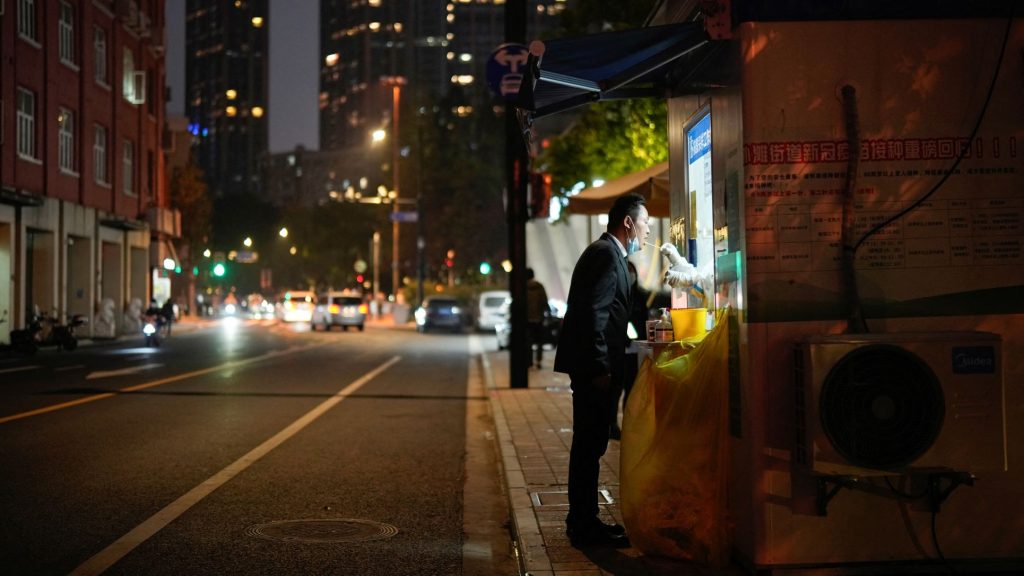China Shortens Quarantines As It Eases Some Of Its COVID Rules

China on Friday eased some of its heavy-handed COVID rules, including shortening quarantines by two days for close contacts of infected people and for inbound travellers, and removing a penalty for airlines for bringing in too many cases.
The loosening of the rules, a day after President Xi Jinping led his new Politburo Standing Committee in a meeting on COVID, cheered markets even as many experts warned that the measures are incremental and reopening probably remains a long way off.
Under the new rules, centralised quarantine times for close contacts and travellers from abroad were shortened from seven to five days. The requirement for three further days in home isolation after centralised quarantine remains.
China will also stop trying to identify “secondary” contacts – a major annoyance for residents of cities who are caught up in sweeping contact-tracing efforts when a case is found – while still identifying close contacts.
“Optimising and adjusting prevention and control measures is not relaxing prevention and control, let alone opening up and ‘laying flat’, but to adapt to the new situation of epidemic prevention and control and the new characteristics of COVID-19 mutation,” the National Health Commission (NHC) said.
China’s yuan currency extended gains to a seven-week high after the news and the blue chip CSI 300 Index rose 2.8% in afternoon trade, while Hong Kong’s Hang Seng Index jumped more than 7%, its biggest daily gain since March.
The easing of rules comes even as case numbers in China surge to their highest since April, with Beijing and the central city of Zhengzhou seeing record tallies, and numerous cities widened localised lockdowns and other measures, including in the southern metropolis of Guangzhou.
“Some interpretations are being too optimistic,” said Bruce Pang, chief economist at Jones Lang Lasalle.
“The COVID policy will only be fine-tuned in the short term, with the focus shifting between eliminating cases and making more precise measures,” he said.
The news was greeted with both excitement and wariness among Chinese citizens fed-up with nearly three years of COVID curbs, which are taking a mounting toll on the world’s second-largest economy.
Travel platform Qunar said search volumes for international flights tripled from a day earlier and were still rising.
“It depends on how the localities execute. I’m afraid to be optimistic,” one user of the Twitter-like Weibo posted after the easing steps were announced on Friday.
‘BABY STEP’
Among the new measures, China is adjusting categorisation of COVID risk areas simply to “high” and “low” – eliminating the “medium” category, an effort to minimise the number of people coming under control measures.
The NHC also said it would develop a plan to accelerate vaccinations, which experts say is crucially needed before the country can begin more fully dialling-back a zero-COVID policy that has made China a global outlier.
The new steps include ending the “circuit breaker”, under which airlines faced a suspension of flights if they brought in too many COVID-infected passengers, a system that caused frequent cancellations and inconvenience. Still, international flights remain at a small fraction of pre-COVID levels.
“It is a baby step in the right direction,” Joerg Wuttke, president of the European Union Chamber of Commerce in China, said of the new rules.
“But the big question looming over all of us is when is China ready to actually start a vaccination campaign that gives them the herd immunity to really open up the country?”
Many experts say China is unlikely to begin reopening until after the March session of parliament, at the earliest.
‘STAY AT HOME’
This week, cities across China have imposed tighter prevention and control measures as case numbers surge, although they are low by global standards.
Authorities reported 10,535 new domestically transmitted cases for Thursday, the most since April 29, when Shanghai was battling its most serious outbreak under strict lockdown.
The city of Guangzhou – a manufacturing and transport hub and the epicentre of China’s current COVID fight – reported 2,824 new local cases for Thursday, the fourth day in which infections exceeded 2,000.
Driving the surge were cases in the populous Haizhu district, which extended a lockdown until Sunday. At least three of Guangzhou’s 11 districts have been put under some sort of restriction.
“Only one person in each household is allowed to buy daily necessities on a staggered schedule,” the district government said. All public transit in the district of 1.8 million people was suspended, and mandatory PCR tests will be administered to “every household and every individual”, it said.
The cities of Beijing, Zhengzhou and Chongqing also tightened measures as daily cases rose to around all-time highs.
Zhengzhou, capital of central Henan province, reported 2,988 new cases, more than doubling from a day earlier, in a widening outbreak that sparked chaos at an iPhone assembly plant of Apple supplier Foxconn.
In the southwestern metropolis of Chongqing, cases remained in the triple digits all week, with a new high of 783 on Thursday. Some districts on Friday banned dining at restaurants and some subway stations were closed.
Beijing reported a record 118 new domestic cases for Thursday, with some parts of the city of 22 million urging daily testing for three more days. Some Beijing areas have barred entry to public spaces including offices, leisure venues and fitness centres.
(Reporting by Ryan Woo, Tony Munroe, Albee Zhang, Ellen Zhang and Martin Quin Pollard; Additional reporting by Josh Ye in Hong Kong and Jason Xue in Shanghai; Editing by Gerry Doyle, Robert Birsel and Tomasz Janowski)




